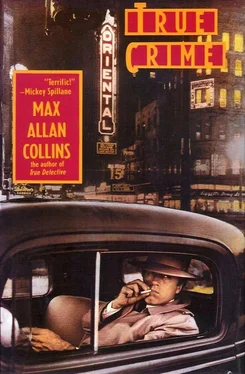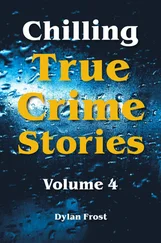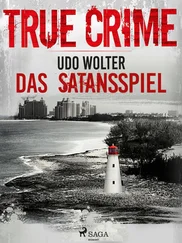“But that’s only if Lawrence, or Dillinger or whoever he is, pulls a gun.”
Purvis nodded curtly. “There will be no executions under my aegis.”
Well, that sounded good and it sounded fancy, but I wasn’t convinced. Oh, Purvis was not a bad man; he was a little pompous, and he was certainly in over his head. But he wasn’t stupid, and he wasn’t a coward — his being nervous like this didn’t make him a coward, just human. Still, I remembered the dead civilians at Little Bohemia, which took place under his “aegis,” too. And I had the feeling he — and even good Mormon Cowley — had not really vetoed the Zarkovich plan to blow Dillinger’s brains out. Nor did I think Zarkovich’s plan had been first proposed this afternoon; clearly it had been a part of the package since before a troubled Cowley first turned up at my office, Friday.
I was afraid that Melvin felt he could contain both Lawrence/Dillinger, and Zarkovich. That he could control the situation. He’d had to humor Zarkovich, because Zarkovich was his contact man with Anna Sage; he needed to keep the East Chicago cop happy. But, like Frank Buck, he intended to bring ‘em back alive.
And I just didn’t think Melvin was up to the job.
Brown came back.
He said, “Inspector Cowley says call every fifteen minutes instead of five, from now on.”
“I take it,” Purvis said, “there’s no sign of our man at the Marbro?”
“None,” Brown said.
“If he shows up anywhere,” I said, “it’ll be here. We’re just around the corner from Anna’s.”
“I know,” Purvis snapped. “Damn. Where are they? It’s been almost four hours...”
Brown said, “I think the inspector’s on the verge of giving up the ghost.”
I said, “I think they’re playing with you. Getting you worn out and frazzled. I think it will happen. Tonight.”
“So do I,” Purvis whispered, wide-eyed, and he pointed.
A man in a straw hat, gold-rimmed glasses, a striped white shirt, gray tie and gray pants walked along flanked by two attractive women. One of the women, walking along on the outside, was Polly Hamilton. She was wearing a tan skirt, white blouse and white open-toe sandals; she was beaming, and looked pretty as a summer’s day — or anyway, night.
The other woman arm in arm with Jimmy Lawrence, walking on the inside, also smiling but more restrainedly, was heavier set but still attractive, and wore a white hat and a two-piece burnt-orange bouclé suit. When the lights of the marquee hit her, Anna Sage’s dress seemed almost to glow, and seemed more red than orange.
Blood red.
By five minutes after nine, the rest of the agents had arrived. They parked their cars along North Lincoln Avenue and its side streets and took their positions. Melvin Purvis stood in the recessed area at the right of the box office, near a display case of stills from Manhattan Melodrama. Three more agents were staggered along the street, starting at the left of the box office and continuing on down by Biograph Billiards — though it seemed unlikely the Anna Sage party would head that direction upon exiting the theater, her apartment being the opposite way. Milling about the front of the theater were five men; a couple of them I figured to be East Chicago cops. A couple more agents hovered around the tavern that was next to the theater, a couple more in front of the grocery that was next to the tavern, on the corner by the alley; and seven men were stationed in the alley itself — including three who climbed a fire escape there, to get a bead on their man from above should he flee down the alley. And that did make sense, as the alley was a shortcut to Anna Sage’s.
Just on the other side of the alley, near where I’d parked my coupe, was a man I’d never met, but who was pointed out to me as Capt. Tim O’Neill of East Chicago. A dissipated-looking old copper with black-rimmed glasses and a pockmarked puss.
I viewed this from across the street, where Cowley held down a command post under a streetlamp; several other agents roamed Lincoln Avenue, on this side of the street, among them lady-killer Zarkovich, dressed tonight in a natty black suit and a straw hat, smoking an occasional cigarette in the black holder.
Cowley wasn’t pleased to see me.
“Stay on this side of the street,” he said, pointing a thick finger at me.
“That’s fine with me,” I said. I was the only one of these men not wearing his suitcoat. “I’m unarmed. I’m not interested in Wild West shows.”
Cowley slammed a fist into his hand. “This isn’t going to be any damn Wild West show! Understood?”
“Understood,” I said. “I just hope this cavalry you got riding circles around the fort understands, too.”
With quiet exasperation, Cowley made a motion with two hands like an umpire calling a guy “safe” — only that wasn’t Cowley’s meaning, in my case. He said, “Just stay out of the way. And stay out of this.”
“He isn’t armed, you know.”
“What?”
“I saw him go in. He doesn’t have a coat on. If he’s got a gun, it’s up his ass.”
“I don’t like that kind of talk. You’re crude, Mr. Heller.”
“It’s a rough old world, ain’t it.” I walked away and leaned up against the side of a building, by a barber pole.
Zarkovich, between smokes, wandered up to me; he was just tall enough to be able to look down on me, and I’m six foot. He said, “Warm night, Heller.”
“Getting warmer all the time.”
He had his hands in his pockets; his gold watch chain was showing. He smiled broadly but didn’t show any teeth. Rocked gently on his heels. Said, “I thought you were out of this.”
“Someday I’ll get you and your friends alone and demonstrate the superiority of a piece of lead pipe over a similar length of rubber hose.”
His smile drifted to one side of his face. “Whatever could you mean?”
I didn’t say anything. I wasn’t smiling.
He said, “I overheard Cowley giving you some advice. About staying back, and staying out. That’s good advice. Why not take it?”
“I probably will. I figure you’d like nothing more than for me to catch a stray bullet.”
“Oh, there’s a few things in this life I’d like more than that.” He nodded to himself, as if trying to list them mentally; it was a short list. “A few,” he added, then wandered down and sat in a car parked opposite where his buddy O’Neill was standing by the alley. Occasionally he smoked a cigarette in the black holder.
Across the way, standing by the glass case of movie stills, Purvis was fiddling with a cigar, but not lighting it. Lighting it was supposed to be his signal for recognizing Dillinger.
He claimed he’d recognized Lawrence as Dillinger immediately, when Lawrence walked by arm in arm with Anna and Polly. He’d said to me, and Agent Brown in the back seat, “That’s him. One glimpse tells me everything I need to know.”
“It does?” I asked him.
“It does,” he said, “I’ve studied every available picture of John Dillinger. You couldn’t miss it, if you’d studied that face as much as I have. Just looking at the back of his head I can tell it’s him...”
At this point Dillinger had been buying three tickets from the girl in the box-office window, while Anna and Polly chatted, waiting.
“How many pictures of the back of Dillinger’s head are there?” I asked Purvis, but he didn’t bother answering.
Shortly after Dillinger held the door open for his ladies and went in, so had Purvis. And so had I. He sent Brown to telephone Cowley, and asked me — actually asked me — to help him check out the theater. We’d bought tickets from the girl in the glass booth (no one at the theater had been alerted to the stakeout) and went on into the lobby, where the cool air and the smell of popcorn greeted us. There were a few people at the concession stand — Lawrence/Dillinger not among them, nor either of his ladies. We went into the auditorium, one of us on either aisle, and I began to wish I had brought my gun. The air in here was cooler than the lobby, almost cold. It was very dark. The heads of theater patrons were craned up looking at the silver screen where Mickey Mouse danced with some farm animals and spoke in a squeaky voice that reminded me a little of Purvis.
Читать дальше












